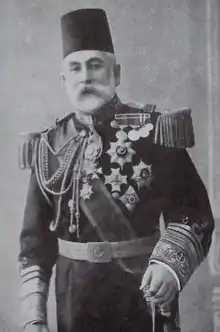Henry Felix Woods Pasha | |
|---|---|
 Woods, inside plate of his autobiography "Spunyarn". | |
| Born | 18 June 1843 Jersey |
| Died | 18 February 1929 (aged 85) |
| Allegiance | United Kingdom Ottoman Empire |
| Service/ | British Navy Ottoman Navy |
Sir Henry Felix Woods Pasha (1843–1929), KCVO, also known as Woods Pasha, was a British-Ottoman admiral and a pasha in Imperial Ottoman Naval Service.[1]
A British naval officer, Woods was born in Jersey in 1843 and educated at the Upper School of Greenwich Hospital (London), which offered training for the Royal Navy. After finishing at the top of his class, he entered as a Masters Assistant. On 17 October 1867, he was appointed a Navigating Lieutenant[2] (a rank which was formerly known as the Master).
He was attached to the British Embassy in the Ottoman Empire, and eventually joined the Imperial Ottoman Navy, where he was given the rank of Admiral. He was Aide-de-Camp for some years to Sultan Abdul Hamid II. After Abdul Hamid was deposed, he was reported by The New York Times to be present at the 1909 coronation of the succeeding sultan, Mehmed V.[3]
Woods Pascha was invested as a Knight Commander of the Royal Victorian Order (KCVO) by King Edward VII at Buckingham Palace on 11 August 1902.[4][5] He was awarded the Grand Cordon of the Medjidie and Osminieh and was a Knight Commander of the Saxe-Coburg Order. He died in 1929 in Constantinople (modern Istanbul).
Publications
- Woods, Henry Felix (1924). Spunyarn: from the strands of a sailor's life afloat and ashore: forty-seven years under the ensigns of Great Britain and Turkey. London: Hutchinson & Co. hdl:2027/uc1.$b57547. OCLC 1080154967.
References
- ↑ Osman, Yusuf. "Levantine testimony 39". Levantine Heritage. Retrieved 28 April 2020.
- ↑ "RN Masters, Staff and Navigating Officers etc". Archived from the original on 22 June 2011. Retrieved 24 November 2010.
- ↑ "New Sultan Breaks Moslem Traditions" (PDF). The New York Times. 11 May 1909. p. 4. ISSN 0362-4331. Retrieved 19 April 2009.
- ↑ "Court Circular". The Times. No. 36844. London. 12 August 1902. p. 8.
- ↑ "No. 27467". The London Gazette. 22 August 1902. p. 5461.